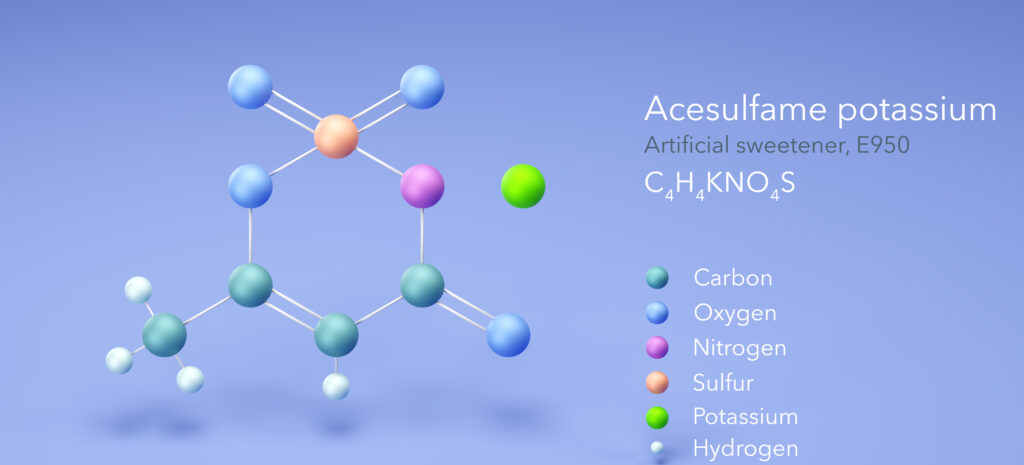Artificial Sweeteners Are Dangerous – Dealing With A Sweet Tooth With Delicious Alternatives
As consumers, we are constantly bombarded with messages telling us to be mindful of our sugar intake. We are told that too much sugar leads to weight gain, insulin resistance, and a host of other health problems. In response, many food companies have turned to artificial sweeteners as a way to satisfy our sweet cravings without the negative effects of sugar. Unfortunately, artificial sweeteners are dangerous so we are essentially just switching out one poison for another.
What Are Artificial Sweeteners?
Artificial sweeteners are synthetic compounds that mimic the taste of sugar but contain little to no calories. They are often used as a sugar substitute in processed foods and beverages such as diet sodas, protein bars, and low-calorie snacks.
Some of the most commonly used artificial sweeteners include:
- Aspartame (Equal, NutraSweet)
- Sucralose (Splenda)
- Saccharin (Sweet’N Low)
- Acesulfame Potassium (Sunett, Sweet One)
While artificial sweeteners may seem like the perfect solution for those looking to cut down on sugar, there is mounting evidence that they pose serious health risks.
Artificial Sweeteners Are Dangerous – Aspartame
Aspartame, also known as NutraSweet or Equal, is a popular artificial sweetener that has been in use for several decades. It was first discovered by chemists James Schlatter and G.D. Searle & Company in 1965 and has since been used as an alternative to sugar in various food and beverage products.1
Despite its widespread use, there have been concerns about the safety of aspartame due to various studies linking it to negative health effects.2
One of the main reasons people opt for artificial sweeteners like aspartame is to reduce their calorie intake and avoid weight gain. However, several studies have shown that aspartame actually leads to weight gain instead of weight loss.3

Metabolic syndrome is a cluster of conditions that increase the risk of heart disease, stroke, and insulin resistance. Studies have shown that regular consumption of aspartame increases the risk of developing metabolic syndrome.4
Aspartame has been found to have negative effects on gut bacteria, which leads to digestive issues and even contributes to the development of chronic conditions such as irritable bowel syndrome.5
Aspartame contains phenylalanine, an amino acid that some people are sensitive to. This sensitivity sometimes manifests as headaches or migraines after consuming products containing aspartame.6
Aspartame contains methanol, which is converted into formaldehyde in the body. Formaldehyde is a known neurotoxin that has been linked to various neurological conditions.7
Artificial Sweeteners Are Dangerous – Sucralose
One of the most commonly used artificial sweeteners is sucralose. Marketed under the brand name Splenda, it is found in a wide range of products from diet sodas and desserts to protein bars and breakfast cereals. Sucralose was approved for use as a food additive by the FDA in 1998 and since then, it has become a staple in many people’s diets.8
Despite its widespread use, sucralose has been linked to a number of health risks. The first concern is its impact on gut health. Studies have shown that sucralose disrupts the balance of bacteria in the gut, leading to inflammation and other digestive issues like Leaky Gut Syndrome.9
Another major concern is the effect sucralose has on blood sugar levels. While it contains zero calories, studies have found that consuming sucralose still causes an increase in insulin and blood sugar levels. This has serious implications for individuals with unstable blood sugar levels or those at risk for developing the metabolic syndrome.10
Sucralose disrupts our taste buds and leads to cravings. Artificial sweeteners are much sweeter than regular sugar, which means that over time, we become accustomed to a higher level of sweetness in our food and beverages. This often leads to a preference for artificially sweetened products and makes it difficult to enjoy natural sources of sweetness like fruits.11
Another danger of sucralose is its potential for addiction. Studies have found that artificial sweeteners activate the same pleasure centers in the brain as regular sugar, leading to cravings and dependence on these products.12
Artificial Sweeteners Are Dangerous – Saccharin
Saccharin was first discovered in 1879 and was initially used as a substitute for sugar during World War I due to sugar shortages. It gained popularity in the United States during World War II when sugar rationing was implemented. Since then, it has been widely used in diet sodas, tabletop sweeteners, and other low-calorie products.13
However, despite its widespread use, saccharin has been surrounded by controversy due to concerns about its safety. In the 1970s, studies on rats showed a link between saccharin consumption and bladder issues. As a result, the US Food and Drug Administration (FDA) proposed a ban on saccharin in 1977.14
However, after extensive research and pressure from the food industry, the FDA decided not to implement the ban but instead require warning labels on products containing saccharin. These warning labels stated that “use of this product may be hazardous to your health” and advised limiting intake.
In the following years, more research was conducted on saccharin’s safety, with conflicting results. In 2000, the National Toxicology Program removed saccharin from its list of potential carcinogens, and the warning labels were officially removed.15
Some studies have suggested a link between saccharin consumption and various health issues such as headaches, allergies, and digestive problems.16
Artificial Sweeteners Are Dangerous – Acesulfame Potassium
Acesulfame Potassium (Ace-K) is a calorie-free artificial sweetener that is about 200 times sweeter than sugar. It was discovered in 1967 and has been approved for use in foods by the FDA since 1988. You may have seen it listed as an ingredient on products such as diet soda, sugar-free gum, and protein bars. It is also commonly used in combination with other artificial sweeteners to enhance their sweetness.17
Like most artificial sweeteners, Ace-K provides a sweet taste without adding any calories. This is because it does not get metabolized by our bodies like sugar does. Instead, it gets excreted through our urine unchanged. However, unlike some other artificial sweeteners, Ace-K is heat-stable and can be used in cooking and baking without losing its sweetness.

While the FDA has deemed Ace-K safe for consumption, there have been concerns raised about its potential health risks. Some studies have linked it to gastrointestinal issues such as bloating and diarrhea after consuming products containing Ace-K.18
One study found that consuming Ace-K may affect insulin secretion. It was shown to stimulate the release of insulin, which leads to a drop in blood sugar levels. This is problematic for those with hypoglycemia.19
Another study showed that long-term consumption of Ace-K has negative effects on thyroid function. The sweetener was found to disrupt the balance of hormones produced by the thyroid gland, leading to issues such as weight gain and fatigue.20
Natural Sweeteners In Whole Foods
Eating a diet of whole, unprocessed foods is ideal, but may be difficult for anyone who has been consuming processed foods exclusively. If you have an insatiable sweet tooth that requires sugar or sugar substitutes of some sort, fruit is your healthiest option. While I recommend eating fruit that has a low-glycemic index, it is still far better to consume sweet fruits than processed alternatives. If you need to, indulge yourself in sweet fruits like grapes from time to time.
Read more about eating a healthy diet.
Repairing The Damage Caused By Artificial Sweeteners
To address health issues attributed to the consumption of artificial sweeteners and other ingredients in processed foods, we must first stop eating them and repair the cellular damage they caused. The way to go about this is to follow the 5Rs.
R1 – Remove Toxins From External Sources
One of the first steps towards improving cellular health is identifying and eliminating sources of toxins. This involves making changes in our daily habits and environment to prevent external toxins from entering our bodies. By avoiding processed foods and reducing exposure to sugar substitutes, we can significantly reduce our intake of toxins.
R2 – Regenerate Damaged Cellular Membranes
Years of exposure to toxins damages cellular membranes, making it crucial to repair them. This process involves lipid synthesis, which allows cells to produce new phospholipids and incorporate them into damaged membranes. In addition to the nutraceuticals provided in the Pompa Program, incorporating healthy dietary fats is vital for promoting membrane repair.
Eating a diet rich in omega-6 and omega-3 fatty acids is essential for maintaining proper membrane function. Natural foods rich in these fats play a key role in regulating membrane fluidity and permeability.21
R3 – Restore Cellular Energy
Mitochondria are crucial for maintaining cellular function as they produce ATP, the primary source of energy for our cells. They also aid in detoxification and regulate gene expression. To support existing mitochondrial function and promote the growth of new mitochondria, the Pompa Program incorporates specific nutraceuticals that optimize cellular energy production.22
R4 – Downregulate Cellular Membrane Inflammation
When our cells are inflamed, it leads to a shortage of ATP, triggering an increase in enzymes responsible for producing harmful oxidants. This creates a cycle of chronic inflammation and further health issues. To break this cycle, specialized nutraceuticals are necessary to reset membrane inflammation back to baseline.23
R5 – Reestablish Methylation
Methylation is essential for keeping “negative” genes inactive. However, exposure to toxins decrease methylation levels, causing these genes to become active and contribute to disease. By reestablishing proper methylation levels, we can turn off these harmful genes and promote better health.24
To learn even more about the 5Rs, join me in my free webinar or read more about what causes weight gain.
References
1 History & controversy – Aspartame. (2019). https://aspartame.org/history-controversy/
2 Shaher SAA, Mihailescu DF, Amuzescu B. Aspartame Safety as a Food Sweetener and Related Health Hazards. Nutrients. 2023 Aug 18;15(16):3627. doi: 10.3390/nu15163627. PMID: 37630817; PMCID: PMC10459792.
3 Pang MD, Goossens GH, Blaak EE. The Impact of Artificial Sweeteners on Body Weight Control and Glucose Homeostasis. Front Nutr. 2021 Jan 7;7:598340. doi: 10.3389/fnut.2020.598340. PMID: 33490098; PMCID: PMC7817779.
4 Santos NC, de Araujo LM, De Luca Canto G, Guerra ENS, Coelho MS, Borin MF. Metabolic effects of aspartame in adulthood: A systematic review and meta-analysis of randomized clinical trials. Crit Rev Food Sci Nutr. 2018;58(12):2068-2081. doi: 10.1080/10408398.2017.1304358. Epub 2017 Aug 18. PMID: 28394643.
5 Ahmad SY, Friel J, Mackay D. The Effects of Non-Nutritive Artificial Sweeteners, Aspartame and Sucralose, on the Gut Microbiome in Healthy Adults: Secondary Outcomes of a Randomized Double-Blinded Crossover Clinical Trial. Nutrients. 2020 Nov 6;12(11):3408. doi: 10.3390/nu12113408. PMID: 33171964; PMCID: PMC7694690.
6 Romani C, Palermo L, MacDonald A, Limback E, Hall SK, Geberhiwot T. The impact of phenylalanine levels on cognitive outcomes in adults with phenylketonuria: Effects across tasks and developmental stages. Neuropsychology. 2017 Mar;31(3):242-254. doi: 10.1037/neu0000336. PMID: 28240926; PMCID: PMC5331922.
7 Czarnecka K, Pilarz A, Rogut A, Maj P, Szymańska J, Olejnik Ł, Szymański P. Aspartame-True or False? Narrative Review of Safety Analysis of General Use in Products. Nutrients. 2021 Jun 7;13(6):1957. doi: 10.3390/nu13061957. PMID: 34200310; PMCID: PMC8227014.
8 Schiffman SS, Rother KI. Sucralose, a synthetic organochlorine sweetener: overview of biological issues. J Toxicol Environ Health B Crit Rev. 2013;16(7):399-451. doi: 10.1080/10937404.2013.842523. PMID: 24219506; PMCID: PMC3856475.
9 Méndez-García LA, Bueno-Hernández N, Cid-Soto MA, De León KL, Mendoza-Martínez VM, Espinosa-Flores AJ, Carrero-Aguirre M, Esquivel-Velázquez M, León-Hernández M, Viurcos-Sanabria R, Ruíz-Barranco A, Cota-Arce JM, Álvarez-Lee A, De León-Nava MA, Meléndez G, Escobedo G. Ten-Week Sucralose Consumption Induces Gut Dysbiosis and Altered Glucose and Insulin Levels in Healthy Young Adults. Microorganisms. 2022 Feb 14;10(2):434. doi: 10.3390/microorganisms10020434. PMID: 35208888; PMCID: PMC8880058.
10 Risdon S, Battault S, Romo-Romo A, Roustit M, Briand L, Meyer G, Almeda-Valdes P, Walther G. Sucralose and Cardiometabolic Health: Current Understanding from Receptors to Clinical Investigations. Adv Nutr. 2021 Jul 30;12(4):1500-1513. doi: 10.1093/advances/nmaa185. PMID: 33578411; PMCID: PMC8321845.
11 Nichol AD, Salame C, Rother KI, Pepino MY. Effects of Sucralose Ingestion versus Sucralose Taste on Metabolic Responses to an Oral Glucose Tolerance Test in Participants with Normal Weight and Obesity: A Randomized Crossover Trial. Nutrients. 2019 Dec 20;12(1):29. doi: 10.3390/nu12010029. PMID: 31877631; PMCID: PMC7019725.
12 Yin KJ, Xie DY, Zhao L, Fan G, Ren JN, Zhang LL, Pan SY. Effects of different sweeteners on behavior and neurotransmitters release in mice. J Food Sci Technol. 2020 Jan;57(1):113-121. doi: 10.1007/s13197-019-04036-6. Epub 2019 Aug 21. PMID: 31975714; PMCID: PMC6952499.
13 Science History Institute. (2023, June 1). The Pursuit of Sweet | Science History Institute. https://www.sciencehistory.org/stories/magazine/the-pursuit-of-sweet/
14 Liu L, Zhang P, Wang Y, Cui W, Li D. The relationship between the use of artificial sweeteners and cancer: A meta-analysis of case-control studies. Food Sci Nutr. 2021 Jun 23;9(8):4589-4597. doi: 10.1002/fsn3.2395. PMID: 34401106; PMCID: PMC8358351.
15 Sharma A, Amarnath S, Thulasimani M, Ramaswamy S. Artificial sweeteners as a sugar substitute: Are they really safe? Indian J Pharmacol. 2016 May-Jun;48(3):237-40. doi: 10.4103/0253-7613.182888. PMID: 27298490; PMCID: PMC4899993.
16 Lohner S, Toews I, Meerpohl JJ. Health outcomes of non-nutritive sweeteners: analysis of the research landscape. Nutr J. 2017 Sep 8;16(1):55. doi: 10.1186/s12937-017-0278-x. PMID: 28886707; PMCID: PMC5591507.
17 Basson AR, Rodriguez-Palacios A, Cominelli F. Artificial Sweeteners: History and New Concepts on Inflammation. Front Nutr. 2021 Sep 24;8:746247. doi: 10.3389/fnut.2021.746247. PMID: 34631773; PMCID: PMC8497813.
18 Bian X, Chi L, Gao B, Tu P, Ru H, Lu K. The artificial sweetener acesulfame potassium affects the gut microbiome and body weight gain in CD-1 mice. PLoS One. 2017 Jun 8;12(6):e0178426. doi: 10.1371/journal.pone.0178426. PMID: 28594855; PMCID: PMC5464538.
19 Cong WN, Wang R, Cai H, Daimon CM, Scheibye-Knudsen M, Bohr VA, Turkin R, Wood WH 3rd, Becker KG, Moaddel R, Maudsley S, Martin B. Long-term artificial sweetener acesulfame potassium treatment alters neurometabolic functions in C57BL/6J mice. PLoS One. 2013 Aug 7;8(8):e70257. doi: 10.1371/journal.pone.0070257. PMID: 23950916; PMCID: PMC3737213.
20 Singh N, Singh Lubana S, Arora S, Sachmechi I. A Study of Artificial Sweeteners and Thyroid Cancer Risk. J Clin Med Res. 2020 Aug;12(8):492-498. doi: 10.14740/jocmr4258. Epub 2020 Jul 1. PMID: 32849937; PMCID: PMC7430875.
21 Gu C, Philipsen MH, Ewing AG. Omega-3 and -6 Fatty Acids Alter the Membrane Lipid Composition and Vesicle Size to Regulate Exocytosis and Storage of Catecholamines. ACS Chem Neurosci. 2024 Feb 21;15(4):816-826. doi: 10.1021/acschemneuro.3c00741. Epub 2024 Feb 12. PMID: 38344810; PMCID: PMC10884999.
22 Zolkipli-Cunningham Z, Falk MJ. Clinical effects of chemical exposures on mitochondrial function. Toxicology. 2017 Nov 1;391:90-99. doi: 10.1016/j.tox.2017.07.009. Epub 2017 Jul 27. PMID: 28757096; PMCID: PMC6078194.
23 Pall M. L. (2013). The NO/ONOO-cycle as the central cause of heart failure. International journal of molecular sciences, 14(11), 22274–22330. https://doi.org/10.3390/ijms141122274
24 Dhar GA, Saha S, Mitra P, Nag Chaudhuri R. DNA methylation and regulation of gene expression: Guardian of our health. Nucleus (Calcutta). 2021;64(3):259-270. doi: 10.1007/s13237-021-00367-y. Epub 2021 Aug 16. PMID: 34421129; PMCID: PMC8366481.
Disclaimer: All rights reserved. Information provided is for general purposes and not intended to provide medical advice, diagnosis, or treatment. Consult your healthcare professional for medical concerns. About Dr. Pompa




